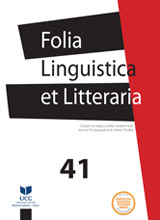EINE EMPIRISCHE STUDIE ZU DEN PHONETISCHPHONOLOGISCHEN INTERLINGUALEN INTERFERENZEN BEI BILINGUALEN WENDE-ALBANERN
AN EMPIRICAL STUDY ON THE PHONETIC AND PHONOLOGICAL INTERLINGUAL INTERFERENCE IN BILINGUAL ALBANIANS DURING THE TRANSITION PERIOD (AFTER THE FALL OF THE COMMUNIST REGIME).
Author(s): Brikena Kadzadej, Mario de MatteisSubject(s): Language studies, Language and Literature Studies
Published by: Filološki fakultet, Nikšić
Keywords: phonetics; phonology; interlingual; interference; survey; bilingual; word accent; compound words
Summary/Abstract: In this article, interference is defined as the incorrect and mostly unconscious transfer of linguistic features from one language to another by bilingual speakers (namely Albanians during the democratic transition period), caused by the mutual impact of both languages (German and Albanian). The aim of the present article is to make an exhaustive list of the interference occurrences at the phonetic and phonological level among bilingual Albanians during the transition period, to describe them and draw appropriate conclusions about such linguistic phenomena. The present study draws on important scientific findings as well as the collected data of an empirical study on Albanian-German bilingualism (including a questionnaire and corresponding interviews). With reference to the research on „Albanian-German bilingualism in the transition period emigrants”, we were made aware of the phonetic and phonological interference phenomena, usually caused by the influence or contact between the two languages (German -Albanian). In the case of interference, languages have an indirect effect on one another and internal changes that cannot always be recognized externally might occur. (Kielhöfer and Jonekeit 63-64) To justify our concern, we have carried out a survey (interviews) on bilingualism, which enables an insight into the bilingual upbringing of the test subjects, namely the extent to which the two languages (German and Albanian) are used in everyday life and the influence they have on each other. Only bilingual Albanian and German-speaking test subjects were interviewed (a total of 35 test subjects 27 males and 8 females between the age of 24 and 33). They had been exposed to both languages and had learned the second language in the kindergarten or when entering school at the latest. The questionnaire and the interviews have been carried out in both languages (Albanian and German), depending on which language the subjects were able to speak. The interview is an open-ended, semi-structured one, i.e., an interview in which the respondents are allowed to ask additional questions that do not appear in the guidelines. This enables the researchers to respond to them and ask more precise questions. Interview recordings are used as proof of this linguistic investigation. As the title of the article states, the subjects of this survey are exclusively bilingual Albanians who immigrated to Germany after the reunification in the 1990s. Under the communist regime that had ruled the country for several decades, emigration was strictly forbidden and considered a criminal offence. Only after the fall of the Berlin Wall did there begin a real mass emigration. The subjects of our investigation are Albanian emigrants of this historical period: families who left their homeland to find work and live in a new country like Germany. Their children grew up between two different cultures, their “parents’ home culture” and that of the new country. Any language level, oral or written, can be affected by interference. This study deals with the interlingual interference errors on the phonetic level: When phonetic and phonological norms and rules of one language are adopted by another, phonetic and phonological interferences arise, which are often perceived as a foreign-language accent. According to the recordings, almost all of the interviewees made mistakes in segmental and suprasegmental phonetics, such as the incorrect pronunciation of phones or a foreign word accent. In our opinion, the occurrence of the interferences in the phonetic and phonological area, highlighted by the investigation, is related to the fact that the test subjects generally use German more than Albanian, both concerning the amount of time and the communicative needs which require that they use it at school, home and other social environments on a daily basis. According to the interviews carried out, this fact is put down to the Albanian language level of the test subjects which indicates that even those who pretend to be bilingual speakers cannot completely differentiate between the two language systems (Albanian and German). Phonetic and phonological interferences have often been noticeable among the German-speaking Albanians: Probably this might be caused by the significant difference in nature between the German and the Albanian language.
Journal: Folia Linguistica et Litteraria
- Issue Year: 2022
- Issue No: 41
- Page Range: 211-221
- Page Count: 11
- Language: German

